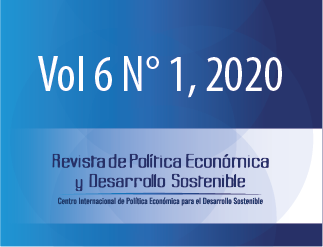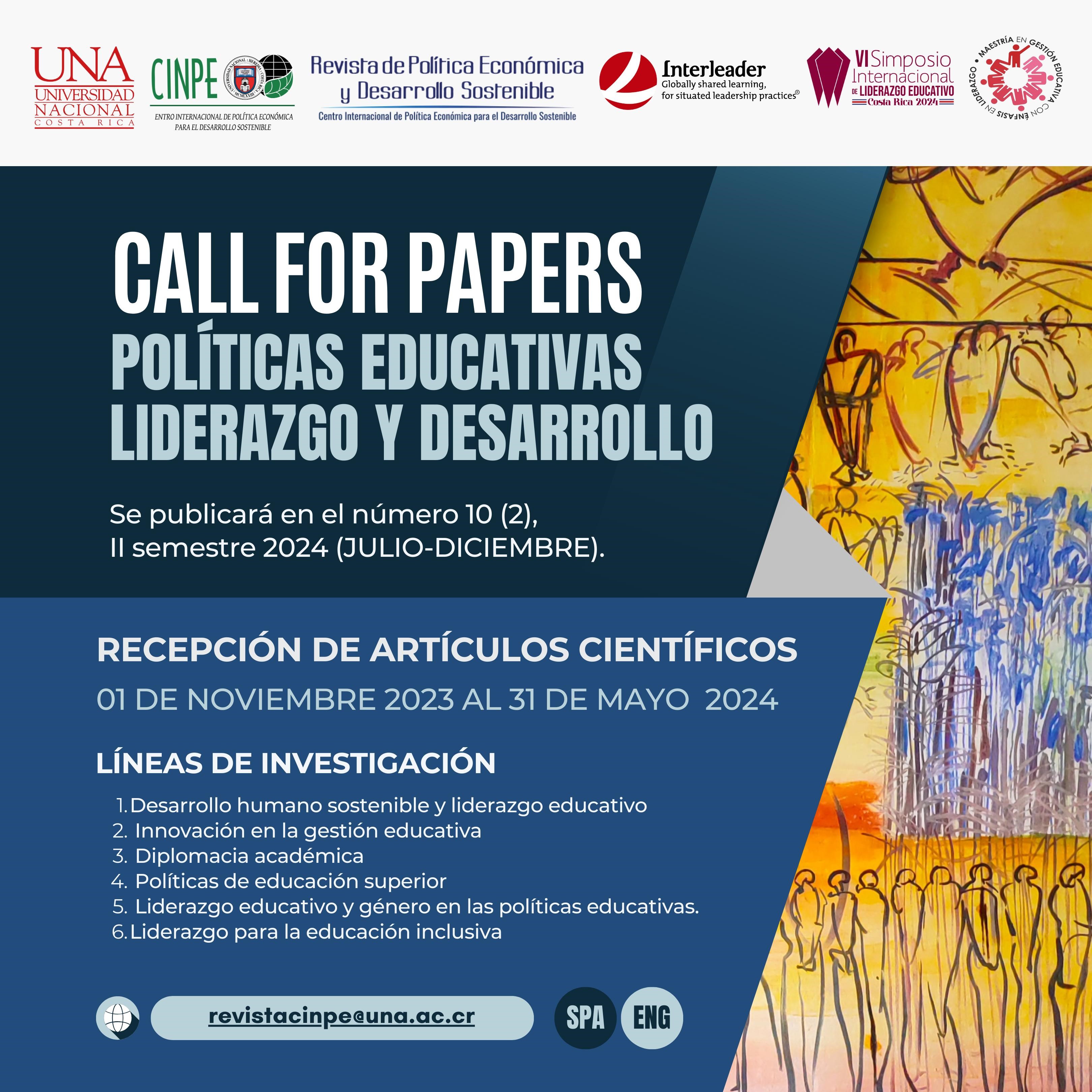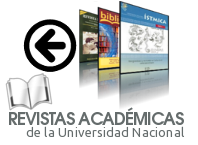Renewable energy as a motor for a decarbonized and inclusive economy by 2050:
public policy considerations in Costa Rica
DOI:
https://doi.org/10.15359/peds.6-1.6Keywords:
Public goods, Climate Change, Sustainable development, Energy governance, Public policyAbstract
Energy governance distinguishes amongst its main challenges access and energy security, climate change and other environmental impacts, as well as economic and social development. This research examines the links between renewable energy and these challenges, as well as the opportunities it offers to achieve the goals of economic prosperity, decarbonization and inclusion from the perspective of public policy. To this end, a systematic review of the global energy governance literature was conducted and a historical analysis of the case of the electricity sector in Costa Rica and the main policy instruments related to the triple goals, closing with the example of the Decarbonization Plan 2050. For the processing of information, a qualitative analysis based on the process-tracing method was applied. The theoretical approach was nurtured by the concepts of governance, public goods and the central role of the State. Main results show that the country's electricity model currently produces almost 100% of its electricity with renewable energy, which despite having its own challenges, needs to permeate other sectors, mainly transport, in order to reduce emissions and boost the economy. The Decarbonization Plan stands out as a policy tool to drive the system of energy governance towards climate goals and sustainable economic recovery in the long term, however its scope is limited in terms of social inclusion.
References
ARESEP (2018). Estadísticas del mercado eléctrico nacional. https://aresep.go.cr/electricidad/index.php?option=com_content&view=article&id=1389&catid=106
Avendaño Leadem, D.F. & García Sánchez, D. (2019). Path dependence (trayectorias dependientes) en la matriz eléctrica de Costa Rica. Geo UERJ, (35), 44815.
Beach, D. & Pedersen, R. B. (2013). Process-Tracing Methods: Foundations and Guidelines. Ann Arbor: University of Michigan Press.
Bennett, A. & Checkel, J. T. (2012). Process tracing: from philosophical roots to best practices. Simons Papers in Security and Development, 21, 30.
Bradford, T. (2006). Solar Revolution: The Economic Transformation of the Global Energy Industry. Cambridge MA: The MIT Press.
Corry, O. (2010). What is a (global) polity?. Review of International Studies, 36(S1), 157-180.
Deloitte (2013). Alternative thinking 2013: renewable energy under the microscope. http://www2.deloitte.com/
Doyle, A. (2009). Tiny "carbon neutral" club struggles with costs. Reuters, Tue Nov 24, 2009.
Dubash, N. K. & Florini A. (2011). Mapping global energy governance. Global Policy, 2, 6-18.
EUISS (2010). Global Governance 2025: At a Critical Juncture. Paris: The European Union Institute for Security Studies.
Eurostat (2012). Renewable Energy Statistics. http://epp.eurostat.ec.europa.eu/
Fletcher R. (2010). When Environmental Issues Collide: Climate Change and the Shifting Political Ecology of Hydroelectric Power. Peace & Conflict Review 5 (1), 1-15.
Flüeler, T., Goldblatt, D.L., Minsch, J. & Spreng, D. (2012). Energy-related challenges. In Spreng, D. et al. (Eds.), Tackling Long-Term Global Energy Problems: The Contribution of Social Science (pp. 11-22). Dordrecht, NL: Springer.
García González, D. (2018). ¿…Y para cuándo los bienes públicos? Democracia, desarrollo y territorio en Centroamérica y República Dominicana. Fundación DEMUNCA.
García Sánchez, D. & Avendaño Leadem, D. (2018). Energy transition and path dependence: The case of Costa Rica. Revista Geográfica de América Central, 61E (3), 281-296.
García Sánchez, D. (2014). Solar energy and the problem of path dependence in Costa Rica’s energy system. Hamburg, Deutschland: Dissertation zur Erlangung der Würde einer Doktorin der Wirtschafts und Sozialwissenschaften, Fakultät Wirtschaft und Sozialwissenschaften, Universität Hamburg.
Goldthau, A. (2014). Rethinking the governance of energy infrastructure: Scale, decentralization and polycentrism. Energy Research and Social Science 1, 134-140.
Gössling, S. (2009). Carbon neutral destinations: a conceptual analysis. Journal of Sustainable Tourism 17(1), 17-37.
Hein, W., García S., D. & Holstenkamp, L. (2011). Gobernanza global y evolución de las energías renovables en el sur: Objetivos políticos y estructuras de gobernanza. Letras Verdes 4(8), 12-14.
IEA. (2012). World Energy Outlook 2012. www.iea.org.
IEA (2017). Data and statistics. Data tables, electricity. https://www.iea.org/data-and-statistics/data-tables/?country=WORLD&year=2017&energy=Electricity
IEA. (2018). World Energy Outlook 2018. www.iea.org.
Klein, N. (2015). Esto lo cambia todo. El capitalismo contra el clima. Ediciones Culturales Paidós S.A., México.
Ministerio de Ambiente y Energía [MINAE] (2020). Avances 2019: Plan Nacional de Descarbonización 2018-2050. Compromiso del Gobierno del Bicentenario. https://cambioclimatico.go.cr/
Ministerio de Ambiente y Energía [MINAE] (2019). Plan de Descarbonización 2018-2050. Compromiso del Gobierno del Bicentenario. https://minae.go.cr/images/pdf/Plan-de-Descarbonizacion-1.pdf
Ministerio de Ambiente y Energía [MINAE] & Instituto Meteorológico Nacional [IMN] (2019). Costa Rica: Informe bienal de actualización ante la Convención Marco de las Naciones Unidas sobre el Cambio Climático. http://cglobal.imn.ac.cr/index.php/publications/bur2019/
Ministerio de Ambiente y Energía [MINAE] (2015). Contribución prevista y determinada a nivel nacional de Costa Rica. San José, Costa Rica. https://www4.unfccc.int/sites/submissions/INDC/Published%20Documents/Costa%20Rica/1/INDC%20Costa%20Rica%20Version%202%200%20final%20ES.pdf
MREC (2008). Paz con la Naturaleza. Resumen Anual 2007. Revista Costarricense de Política Exterior Vol. VI N.1.
Norman, E.S., Bakker, K. & Cook, C. (2012). Introduction to the themed section: Water governance and the politics of scale. Water Alternatives 5(1), 52-6.
Pachauri, S. & Spreng, D. (2012). Towards and integrative framework for energy transitions of households in developing countries. In Spreng, D. et al. (Eds.): Tackling Long-Term Global Energy Problems: The Contribution of Social Science (pp. 11-22). Dordrecht, NL: Springer.
Programa Estado de la Nación [PEN] (2019). Informe Estado de la Nación 2019.
Rueschemeyer, D. (2003). Can one or a few cases yield theoretical gains?. Comparative Historical Analysis in the Social Sciences, 305-336.
Sassen, S. (2007). A sociology of globalization. Análisis Político, 20(61), 3-27.
Tissot, R. (2012). Latin America's Energy Future. Discussion Paper No. IDB-DP-252, Inter-American Development Bank.
Transnational Institute [TNI] (2020). Transición justa: Encuentros entre movimientos sociales en pos de la transformación social y ambiental. Amsterdam, marzo de 2020. https://www.tni.org/es/publicacion/transicion-justa
WBGU, German Advisory Council on Climate Change (2011). World in Transition - A Social Contract for Sustainability. Flagship Report. Berlin: WBGU.
World Commission on Dams [WCD] (2000). Dams and Development: A New Framework for Decision-Making: The Report of the World Commission on Dams. Earthscan.
Zürn, M. (2004). Global governance and legitimacy problems. Government and Opposition, 39(2), 260-287.








